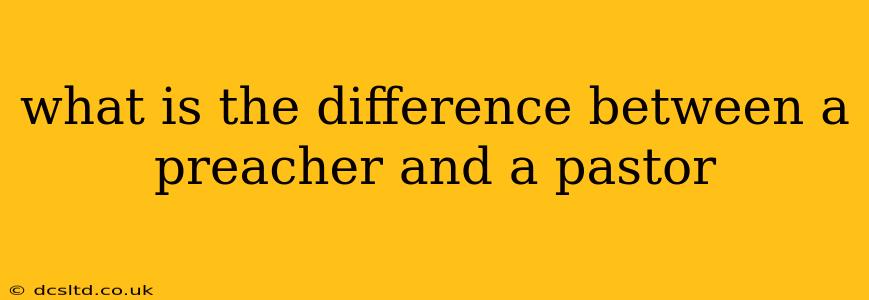What's the Difference Between a Preacher and a Pastor?
The terms "preacher" and "pastor" are often used interchangeably, leading to confusion about their distinct roles and responsibilities. While both involve leadership within a religious community, there are key differences in their focus and functions. Understanding these nuances provides a clearer picture of the varied roles within religious organizations.
What Does a Preacher Do?
A preacher's primary function is preaching, delivering sermons and religious teachings to a congregation. This often involves interpreting scripture, offering inspirational messages, and providing spiritual guidance through spoken word. The emphasis is on public speaking, communication skills, and theological understanding to effectively convey religious messages. Preachers may work within various religious contexts, including churches, independent ministries, or even through traveling evangelistic work. They may or may not have formal theological training. The role often focuses on the delivery of a message rather than the overall shepherding of a community.
What Does a Pastor Do?
A pastor's role is more multifaceted and encompasses a broader scope of responsibilities than that of a preacher. While preaching is often a significant component, a pastor also functions as a spiritual leader and shepherd to their congregation. This involves:
- Providing spiritual guidance and counseling: Pastors offer pastoral care, providing support, guidance, and counsel to individuals and families within their church.
- Leading and managing the church: This includes overseeing church administration, managing finances, coordinating programs, and working with church leadership.
- Building community: Pastors foster relationships and community within the congregation, encouraging fellowship and mutual support among members.
- Performing religious rites: Such as baptisms, weddings, funerals, and other sacraments specific to their denomination.
- Outreach and community involvement: Many pastors actively participate in outreach programs, serving the community beyond the confines of the church building.
Are all Pastors Preachers? Are all Preachers Pastors?
Almost all pastors are preachers, as preaching is a vital part of their role. However, not all preachers are pastors. A preacher may simply focus on delivering sermons, without the broader pastoral responsibilities of leading and shepherding a congregation. Think of itinerant preachers who travel from church to church, delivering sermons but not holding a pastoral position in any single congregation.
What are the Key Differences Summarized?
| Feature | Preacher | Pastor |
|---|---|---|
| Primary Role | Preaching and delivering sermons | Spiritual leadership and shepherding |
| Focus | Communication and theological insight | Community building, pastoral care, administration |
| Responsibilities | Primarily preaching | Preaching, pastoral care, administration, community building |
| Training | Variable, may or may not have formal training | Usually requires formal theological education |
How can I tell the difference?
The title someone uses (Pastor Jones, Reverend Smith, Preacher Brown) can be a helpful, albeit imperfect, indicator. However, the best way to understand the difference is to look at the individual's responsibilities and the context of their work within the religious community.
In conclusion, while the terms are often used interchangeably, the difference lies in the scope of responsibilities and focus. A preacher primarily focuses on delivering sermons, while a pastor assumes a broader role as a spiritual leader and shepherd of their congregation. Both roles are vital within religious communities, each contributing uniquely to the spiritual well-being and growth of believers.
